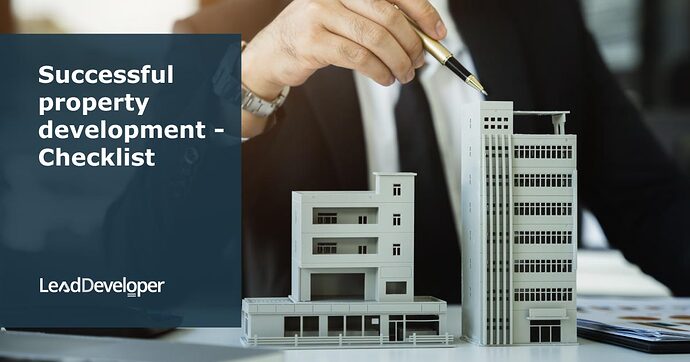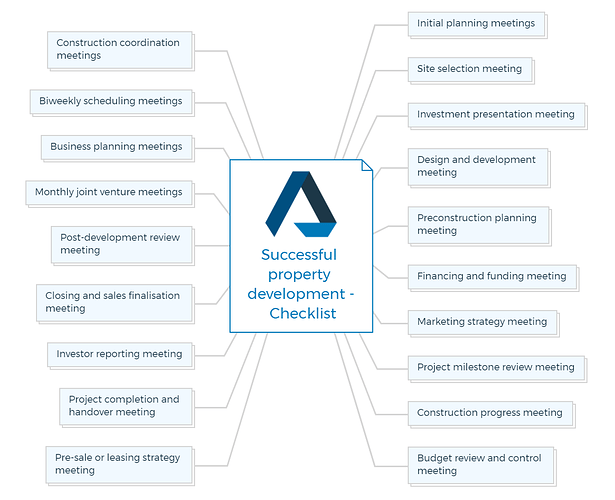1. Initial planning meetings
- Discuss project goals, objectives, and scope.
- Share insights on market research and target audience.
- Align on the overall vision and potential challenges.
2. Site selection meeting
- Present potential site options and their advantages.
- Discuss site feasibility, zoning regulations, and infrastructure.
- Make decisions on site selection based on consensus.

 You are missing out if you haven’t yet subscribed to our YouTube channel.
You are missing out if you haven’t yet subscribed to our YouTube channel.
3. Investment presentation meeting
- Present the project’s financial projections and ROI potential.
- Address questions and concerns from investors regarding returns and risks.
- Discuss investment terms, equity participation, and funding arrangements.
4. Design and development meeting
- Collaborate on the project’s architectural and engineering design.
- Review design concepts, layouts, and materials.
- Ensure the design aligns with market preferences and budget constraints.
5. Preconstruction planning meeting
- Discuss project timelines, milestones, and critical paths.
- Coordinate with construction teams for seamless transition from design to build.
- Review preconstruction budgets and ensure alignment with financial plans.
6. Financing and funding meeting
7. Marketing strategy meeting
- Develop a comprehensive marketing plan to attract potential buyers or tenants.
- Share insights on target demographics, pricing strategy, and branding.
- Discuss promotional activities, digital presence, and advertising campaigns.
8. Project milestone review meeting
- Evaluate progress against project milestones and timelines.
- Address any unforeseen challenges or delays and discuss mitigation strategies.
- Ensure all stakeholders are updated on the project’s status.
9. Construction progress meeting
- Review construction progress, quality, and adherence to design plans.
- Address any construction-related issues or changes required.
- Coordinate with contractors and subcontractors to ensure the project remains on track.
10. Budget review and control meeting
- Review the financial status against the budget and make adjustments if necessary.
- Discuss any unexpected expenses, cost overruns, or savings.
- Ensure financial transparency and accountability.
11. Pre-sale or leasing strategy meeting
- Discuss strategies for pre-selling units or leasing space before completion.
- Plan open houses, virtual tours, and promotional events.
- Coordinate with realtors to attract potential buyers or tenants.
12. Project completion and handover meeting
- Review the final product and ensure it meets quality standards.
- Plan for the handover of units to buyers or tenants.
- Discuss post-construction warranties and maintenance plans.
13. Investor reporting meeting
- Present regular financial reports to investors detailing project performance.
- Discuss actual vs. projected returns and provide transparency on financial matters.
- Address any investor inquiries or concerns.
14. Closing and sales finalisation meeting
- Coordinate final sales or lease agreements with buyers or tenants.
- Discuss closing documents, legal requirements, and transfer of ownership or occupancy.
- Ensure a smooth transition to the operational phase.
15. Post-development review meeting
- Reflect on the project’s successes, challenges, and lessons learned.
- Discuss opportunities for improvement in future projects.
- Collect feedback from all stakeholders for continuous improvement.
16. Monthly joint venture meetings
- Facilitate discussions between joint venture partners.
- Review project progress, financials, and strategic decisions.
- Ensure alignment on goals, objectives, and contributions.
17. Business planning meetings
- Align on the long-term business strategy and direction.
- Discuss new market opportunities, growth plans, and diversification.
- Identify potential challenges and formulate strategic solutions.
18. Biweekly scheduling meetings
- Review the project schedule every two weeks.
- Address any changes, delays, or adjustments to timelines.
- Coordinate tasks and ensure teams are aligned with the project plan.
19. Construction coordination meetings
- Coordinate with contractors, subcontractors, and suppliers.
- Address construction progress, challenges, and resource allocation.
- Discuss on-site safety measures and adherence to quality standards.
You are missing out if you haven’t yet subscribed to our YouTube channel.


